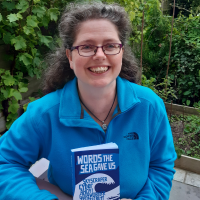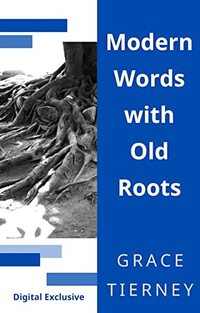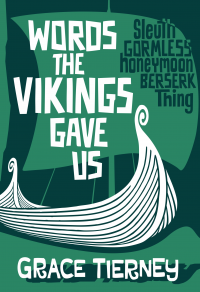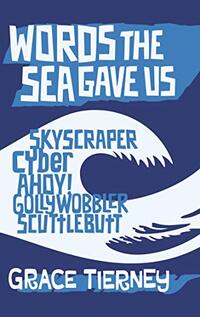Grace Tierney Interview Published on: 03, Feb 2025
 Your Wordfoolery blog has been running for over a decade. What inspired you to start exploring unusual English words, and how has the blog evolved over time?
Your Wordfoolery blog has been running for over a decade. What inspired you to start exploring unusual English words, and how has the blog evolved over time?
I’d always been interested in the origins of words so when I decided to try writing a blog it seemed like a fun topic to explore. Little did I guess I’d still be writing it 16 years later. My own knowledge of linguistics and etymology has expanded with time so the later entries are more detailed, but I try to keep it fun and informative. I have regular readers and the chat with them keeps me motivated.
Your books dive deep into the origins of words from diverse sources like the Vikings, the sea, and even Christmas. How do you choose which themes to explore in your books?The theme has to be something that fascinates me as I’ll be working on the book for about five years from research to publication. I keep a very long list of candidate words (gathered from my reading, conversations, films, podcasts, dictionaries, road signs, museums,…). These are roughly grouped into topics and when I have 50-100 words I consider if the topic is strong enough for a book and if it has been covered before.
What was the most surprising or delightful word origin you’ve uncovered in your research?Tough question! I’ve covered about 10,000 words and my favourites fluctuate but I like ones which reveal an aspect of social history we might otherwise miss. I enjoyed discovering that hecklers at comedy gigs are named for female Scottish yarn industry workers who interrupted political meetings to protest for better working conditions. I have a mental image of these feisty ladies which makes me smile. Their tactics worked and they heckled later as part of the suffragette movement to get votes for women.
In “How To Get Your Name In The Dictionary,” you profile people who contributed to the English language. Was there a particular individual whose story resonated with you the most?I enjoyed the tales I uncovered about the original Casanova. As a young man he worked as a preacher, philosopher, diplomat, gambler, spy, violinist, and broke hearts everywhere. He repeatedly seduced the mistresses of his patrons and his escape from Venice would rival “Ocean’s Eleven”. Of course we only have his word for it, as he settled down in his fifties and wrote a twelve volume autobiography. You have to admire that level of self-belief!
How do you balance the historical and linguistic aspects of your word studies while keeping them engaging for a general audience?Careful editing. It’s tempting to include every detail but the key is to seek out the story. That’s what engages the reader.
Your writing spans books, a blog, and serialized novels. How does your approach differ when writing for these various platforms?Firstly I split my writing week and year between them. Every Monday morning I sit down to write the blog and I keep it light and conversational. The serialised novels I tend to write, using an outline, in a big block of time - writing 1,000 words per day for a month, for example, which keeps the characters and world fresh in my mind.
The books take far longer so they fit in around everything else (I also write columns, short fiction, newsletter, edit, mentor writers, etc). I use my list of words as a starting point, working through them one at a time and form chapters when groupings/themes emerge.
What does your research process look like when delving into the history of words? Do you have favorite resources or methods?As the words come from various root languages and time periods I take a flexible approach using dictionaries, reference books, online resources, encyclopaedia, folklore and social history sources, and more. My starting point on the language side is Etymonline - Online Etymology Dictionary and various dictionaries but often a finished piece about a single word will have used up to ten different sources.
What challenges have you faced in maintaining a long-running blog, and how do you keep it fresh and engaging for readers?Any long running writing job requires dedication, consistent effort, and a deep well of ideas. Luckily I’ve experience since 2001 in writing regular columns for a variety of publications so I have good habits in this regard. My readers suggest words, which helps, and I’m always alert to new ideas. Thankfully the English language has a vast vocabulary so I’ve not run out of words.
You’ve mentored writers through NaNoWriMo for 16 years. How has this experience influenced your own writing journey?Mentoring writers is a pleasure and I’ve made many friends through that volunteer work. It encouraged me to experiment with new genres and to expand my knowledge and skills. The network of others in the same business helps on days when writing feels like a lonely pursuit.
Your novels on Channillo are serialized. What do you enjoy about this format, and how does it compare to writing a full-length book for traditional publishing?It was good enough for Charles Dickens, so it’s good enough for me. Many Victorian novelists serialised their work. The key is to have a strong outline with long running story arcs but also to have a good start-middle-end to each individual episode to draw in readers for the next week. I enjoy spending time with characters I know so well after writing about them for five years and 260,000 words. They feel like friends.
Living in rural Ireland, how does your environment influence your writing, particularly your fiction?I’ve set some of my fiction in the area where I live but the main influence is in my daily walks which give me a much needed break, exercise, and head space to let plots form and ideas brew.
You have a monthly radio slot on LMFM. How did that opportunity come about, and what’s it like to bring word history to a live audience?My regular radio slot was offered after an interview about my “Words the Sea Gave Us” book. The host and I hit it off and she suggested we try chatting about unusual words once a month. Over time we’ve adjusted the format to add in a game where listeners invent silly definitions for obscure words. The feedback from listeners is an absolutely joy. I’ve been lucky enough to talk about word history on radio, podcasts, and live TV, and I love doing so.
You’re also a columnist and short fiction writer. Do you find that shifting between nonfiction and fiction strengthens your creativity?I see writing as writing. Fiction and non require similar skills and I enjoy reading and creating both. Hopefully my readers feel the same way.
Sometimes a little nonfiction will sneak into the background of my fiction and the research skills from nonfiction help when I tackle historic fiction.
When you’re not writing, you enjoy crafting and hiking. How do these activities contribute to your creative process or help you unwind?Over the years I’ve learned it’s very important to unwind if you’re self-employed. Of course there are times, close to deadlines, when you work extra hours, but time off is vital for physical and mental health. Getting out into nature with loved ones, reading, or using my hands in crafts are perfect escape routes for me.
Share Grace Tierney's interview
Grace Tierney is an award-winning author and blogger based in rural Ireland, known for her engaging Wordfoolery blog, which has been exploring unusual English words for over a decade. Grace also shares her passion for language through a monthly radio segment on LMFM. A seasoned mentor for National Novel Writing Month, she has serialized novels on Channillo and contributes to her local paper. When not writing, she enjoys reading, crafting, and hiking.
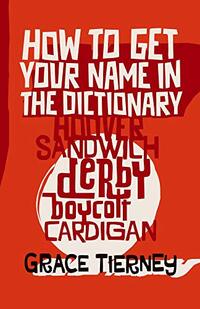 How to Get Your Name in the Dictionary: The Lives Behind Eponyms
Genre: Biographies & Memoirs, History
How to Get Your Name in the Dictionary: The Lives Behind Eponyms
Genre: Biographies & Memoirs, History
